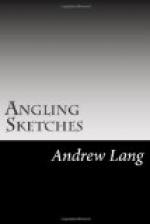attempted to ladle the trout out with the short net;
but he broke the gut, and went off. A landing-net
is a tedious thing to carry, so is a creel, and a
creel is, to me, a superfluity. There is never
anything to put in it. If I do catch a trout,
I lay him under a big stone, cover him with leaves,
and never find him again. I often break my top
joint; so, as I never carry string, I splice it with
a bit of the line, which I bite off, for I really cannot
be troubled with scissors and I always lose my knife.
When a phantom minnow sticks in my clothes, I snap
the gut off, and put on another, so that when I reach
home I look as if a shoal of fierce minnows had attacked
me and hung on like leeches. When a boy, I was—once
or twice—a bait-fisher, but I never carried
worms in box or bag. I found them under big
stones, or in the fields, wherever I had the luck.
I never tie nor otherwise fasten the joints of my
rod; they often slip out of the sockets and splash
into the water. Mr. Hardy, however, has invented
a joint-fastening which never slips. On the
other hand, by letting the joint rust, you may find
it difficult to take down your rod. When I see
a trout rising, I always cast so as to get hung up,
and I frighten him as I disengage my hook. I
invariably fall in and get half-drowned when I wade,
there being an insufficiency of nails in the soles
of my brogues. My waders let in water, too, and
when I go out to fish I usually leave either my reel,
or my flies, or my rod, at home. Perhaps no other
man’s average of lost flies in proportion to
taken trout was ever so great as mine. I lose
plenty, by striking furiously, after a series of short
rises, and breaking the gut, with which the fish swims
away. As to dressing a fly, one would sooner
think of dressing a dinner. The result of the
fly-dressing would resemble a small blacking-brush,
perhaps, but nothing entomological.
Then why, a persevering reader may ask, do I fish?
Well, it is stronger than myself, the love of fishing;
perhaps it is an inherited instinct, without the inherited
power. I may have had a fishing ancestor who
bequeathed to me the passion without the art.
My vocation is fixed, and I have fished to little
purpose all my days. Not for salmon, an almost
fabulous and yet a stupid fish, which must be moved
with a rod like a weaver’s beam. The trout
is more delicate and dainty—not the sea-trout,
which any man, woman, or child can capture, but the
yellow trout in clear water.
A few rises are almost all I ask for: to catch
more than half a dozen fish does not fall to my lot
twice a year. Of course, in a Sutherland loch
one man is as good as another, the expert no better
than the duffer. The fish will take, or they
won’t. If they won’t, nobody can
catch them; if they will, nobody can miss them.
It is as simple as trolling a minnow from a boat
in Loch Leven, probably the lowest possible form of
angling. My ambition is as great as my skill
is feeble; to capture big trout with the dry fly in
the Test, that would content me, and nothing under
that. But I can’t see the natural fly on
the water; I cannot see my own fly,




